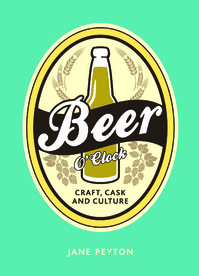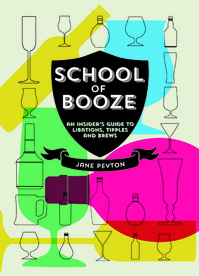Sommelier Jane on beer, whisky, vodka & every beverage known to drinking kind...
Added: Friday, November 22nd 2013
Beer O’Clock: Craft, Cask and Culture
School of Booze: an insider’s guide to libations, tipples and brews
Jane Peyton, Summersdale, £9.99 each
Jane Peyton is a force of nature. She endlessly lectures and extols the virtues of beer. She’s an accredited Beer Sommelier but spreads her wings wider through her School of Booze, which is also the title of her second book. I’m tempted to ask her how she manages to write two books at the same time but it’s not a treadmill I care to join.
She writes well, with short, snappy sentences, an engaging style and a sharp sense of humour. Beer O’Clock is a canter through the history of beer, from its inception in the Old World of Babylonia, Egypt and Mesopotamia where brewing was a gift from the gods and such goddess as Ama-Gestin, Dea Latis, Ninkasi and Siduri were worshipped by imbibers of the juice of the grain.
Jane stresses that beer, far more than other intoxicants, is the beverage that pleases and soothes the world. She underscores the point by listing the myriad names for beer and ale found in just about every language on the planet.
She details the key ingredients used in the brewing process and explains how beer is made, all in an approachable style. The list of hops, while not exhaustive, gives useful notes on the aromas and flavours created by the ingenious green plant. The main body of the book is devoted to outlining the vast number of beer styles available throughout the world, from Abbey to Witbier.
Jane follows this with a summary of the aromas and flavours developed by each style and then suggested beers for matching with food. This includes beers for each meal of the day: I shall try many of her suggestions, though I may draw the line at Heather Ale with my morning porridge. I’m still at teapot stage at breakfast time.
She bravely takes on the anti-alcohol lobby by championing beer not only as a sensible drink but also one that consumed in moderation is beneficial, brewed with pure water, malted grain and hops that are all small storehouses of goodness. This won’t stop her getting letters in green ink from Alcohol Concern and other health Jesuits.
It all adds up to a delightful book. It would be deeply patronising to say it’s a book for beer beginners. We’re never too old to learn and I not only enjoyed this stimulating read but also picked up useful tit-bits of beer knowledge.

School of Booze underscores Jane’s admirable knowledge of all alcoholic drinks. This is a fascinating description of every known form of beverage and their histories. Beer features again, naturally, but you will also learn how the likes of absinthe, bourbon, vodka, whisky and whiskey, Cognac, gin, rum, wine and Champagne are made.
Encouraged by her enthusiasm, I’m tempted to make my own Scotch whisky. It sounds simple enough: boil it, distil it and then – oh dear – leave it for three years to age. I think I’ll stick to a pint of bitter.









